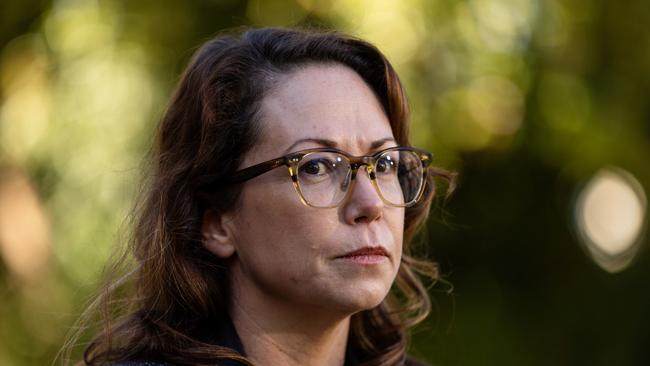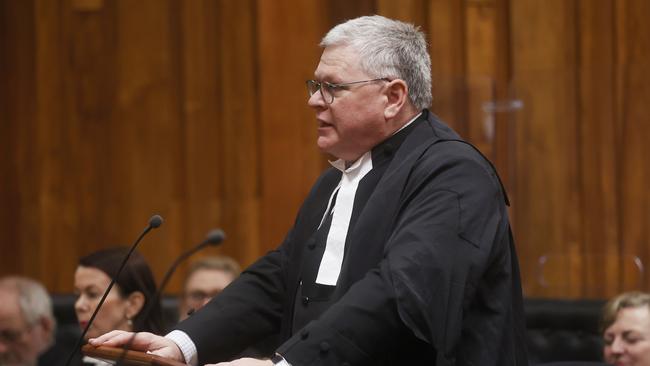‘Drastic’ rape bill favours victims, prejudices accused: lawyers
A bill to stop rape complainants being cross-examined prior to trial has been eviscerated by leading criminal silks who say it tilts the scales of justice towards alleged victims and jeopardises a defendant’s right to a fair trial.

A radical Victorian government proposal to stop rape complainants being cross-examined prior to trial has been eviscerated by leading criminal silks who say it tilts the scales of justice towards alleged sexual assault victims and jeopardises a defendant’s right to a fair trial.
Under the landmark legislation, court committal hearings, which are used to test whether a case is strong enough to send to trial, would be stripped back, and cross-examination of some witnesses in family violence, sexual offence and stalking cases would be banned.
The restrictions would not apply to the alleged victims of other criminal offences.
Australian Bar Association president Peter Dunning KC questioned the timing of the bill and warned that the proposal would mean an accused person did not get a “full opportunity to investigate the case being put against them”.
Mr Dunning said the committal process was critical for those charged with crimes.
“If you’re an innocent person and somebody’s made an allegation against you that is false, you are the person who least understands often why that’s being said against you,” he said.
“So at the committal you get to ask the crown witnesses a whole load of things and really test whether what they’re saying is real and substantial or whether they’re sort of making it up or whether they’re mistaken.”
Mr Dunning said the bill came at a time when there was “unprecedented” criticism of sexual-assault prosecutions that had too little evidence to secure a conviction.
The bill marks Victoria as leading a countrywide reckoning relating to legal frameworks governing sexual assault, with the Australian Law Reform Commission due to hand down a report into justice responses to sexual violence in late January.

Meanwhile, a Labor-sparked review into Australia’s rape laws released last month praised a national shift towards affirmative-consent models that required less scrutiny of complainants in courts and would lead to more prosecutions of nuanced sexual-violence cases.
But top barristers claim there is already a “robust legislative framework” preventing defence counsel from asking traumatic questions of vulnerable witnesses, and better measures could be put in place to protect complainants from retraumatisation.
Victorian criminal barrister Sally Flynn KC said the removal of the committal test denied accused people a “significant protection”.
“The government have claimed that the purpose of the bill is to improve efficiencies in the criminal justice system as well as reducing trauma for victims and witnesses by having the opportunity to cross-examine them minimised,” she said.
“These changes will be at the expense of an accused’s right to a fair trial.”
Ms Flynn said the proposed bill would put heavier financial and administrative burdens on higher courts.
“The consequence of removing the ‘filter’ from the earliest substantive stage of the criminal justice system is that it pushes the cost and expense of ascertaining the relative strength of a prosecution case to the higher courts,” she said.
“Such cost would be borne by all involved – accused persons, prosecuting agencies and the state – in the additional workload placed on the trial courts.”
She said the proposal could also cause further damage to an alleged victim who was dragged through a trial, only to have an unsatisfactory verdict that could have been ascertained at the committal process.
“Another potential consequence of the bill is that alleged victims are dragged much further along through the process, no doubt maintaining hope of a conviction that is, given the weakness of the case, highly unlikely to eventuate,” she said.
“This can lead to additional and unnecessary distress and trauma for complainants and witnesses. The delays in the timely resolution of weak cases do not benefit any party to the proceeding.”
In announcing the reforms late last month, Victorian Attorney-General Jaclyn Symes said they would “ease the burden of repeated testimony, helping them move through court proceedings and get on with their lives”.
“Committal proceedings have evolved over time and need updating – that’s why we’re modernising them by streamlining processes and removing the committal test,” she said.
A statement from the Victorian Bar said the strength of “any prosecution case only becomes apparent once witnesses are required to face cross-examination. It is at that crucial point that deficiencies in the evidence become apparent”.
“Once the evidence has been tested through cross-examination, if the prosecution case is strengthened, this encourages accused persons to make earlier offers to resolve charges to pleas of guilty,” the statement reads.
“If the prosecution case is weakened, the prosecution may accept a plea to a lesser charge or a withdrawal or discharge of some or all charges may occur at this early stage.”

Mr Dunning’s questioning about the timing of the bill come amid longstanding tension between the NSW prosecution office and members of the state judiciary, some of whom say the ODPP puts accused rapists on trial despite not having enough evidence to secure a conviction.
The NSW Judicial Commission in August upheld a complaint made by top prosecutor Sally Dowling SC against judge Robert Newlinds, after he had accused her office of making “lazy and perhaps politically expedient” referrals of meritless rape accusations to court.
The commission recommended Judge Newlinds sit aside from criminal trials at the discretion of chief judge Sally Huggett.
Earlier this month the commission partly upheld a similar complaint against judge Peter Whitford, ruling his accusations that the ODPP runs matters “without apparent regard to whether there might be reasonable prospects of securing a conviction” were made “without evidentiary foundation”.
Mr Dunning said there was “a whole suite” of “important” measures that could assist vulnerable witnesses in the courtroom before removing cross-examination at committals.
“One of them is rules around what can and can’t be asked in questioning,” he said. “Others that are also very important are that not everyone can come and sit in the courtroom and watch the complainant give her or his evidence. Perhaps shielding them from the accused person visually, if that matters.”




To join the conversation, please log in. Don't have an account? Register
Join the conversation, you are commenting as Logout